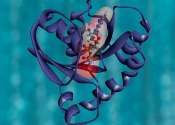Study describes new mechanism for terminating transcription of DNA into RNA in bacteria
A bacterial protein helps to stop transcription—the process of making RNA copies of DNA to carry out the functions of the cell—by causing the cellular machinery that transcribes the DNA to pause at the appropriate spots ...









